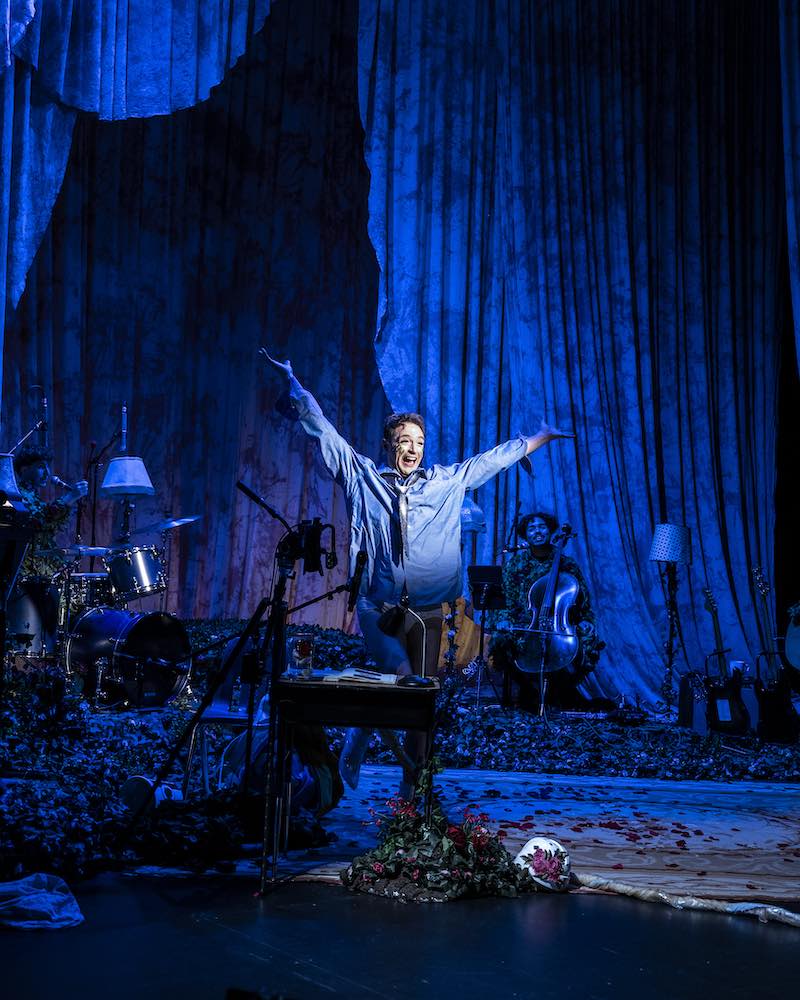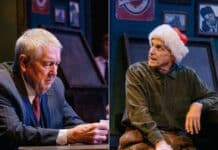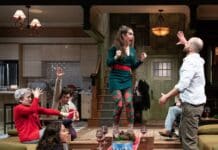I love it when theater disrupts gender hegemony. Questions it, refutes it, mocks it, rejects it — whenever theater as a public art form makes male supremacy detumesce, I’m there.
So it was that I went to Woolly Mammoth Theater to see Rose: You Are Who You Eat, an enthralling autobiographical cabaret conceived, written, and performed by John Jarboe. Accompanied by a band of four, she sings, tells stories, and engages the audience in her remarkable gender journey. I knew immediately I wanted to know more, and I was delighted that she agreed to what became a lively Zoom. (Our conversation has been edited for length and clarity.)

John Stoltenberg (he/him): I am a longtime theater lover and gender interrogator, so I was really moved by what you did in Rose: You Are Who You Eat. The show was not only successful as liberatory performance art (unabashedly experimental); it also took the conversation about theater and gender into some bold and exciting new territory — and I’d like to talk with you about that.
John Jarboe (she/her): That’s so kind and lovely to hear. And yeah, I’m totally game and excited about the lens that you’re using.
As I’m sure you know well, most conventional commercial theater functions not like gender liberation but more like a social imposer of gender templates, like an electrified fence around polar-opposite stereotypes of male and female that zaps anyone who rebels. You probably have a sense of what I’m talking about.
Oh, I do. I do.
Actors’ employability depends on getting with that polarity program, and audiences come in their comfort zone primed for polarity. But Rose renounces that. Rose celebrates holistic gender integration. Would you talk about what you would like theater to do different about gender? You’re doing it already with Rose, but what would you like theater in general to be doing different?
I went to an amazing theater program at University of Michigan. I started out doing more traditional theater. I was doing a lot of mediocre Shakespeare and mediocre musical theater in Philadelphia. And it was really finding the cabaret form that liberated my sense of how I could perform gender and identity on stage, mostly because I could talk directly to the audience. I could be scripted or unscripted, it was acknowledging the real conversation that was in the room. I think you’re saying it so beautifully in terms of this idea of being reduced to a polarity.
I think theater should be a space of imagination, of dreaming, of expansion and abundance. Theater should be genderful, and as genderful as its audiences are. It should be looking for the nuances, the gray areas. It should be taking the binary and wresting it apart. One of my dear friends, Sam Rise, who’s an amazing queerdo in Philadelphia, calls gender a galaxy — it’s like a constellation. And I feel that’s what theater should be doing — in representation, in casting, in gender expression, in the kinds of relationships we show on stage. It’s a shame when you see theater being reductive or limiting. Theater should be exposing you to the galaxy that is gender, which we all have access to.

I want to go back to the incident that inspired your show, that conversation you had with your kindly aunt. How old were you?
I was 33 at the time.
And you told her that you’re genderqueer and you use she/her pronouns. Is that right?
Yeah. And then she paused and she thought and she said: “You had a twin in the womb and you ate her. That’s why you are the way you are.”
So that story became your personal gender revelation?
Yeah. I think there’s moments in life where people tell you who you are. There’s gifts that happen where someone sees you. My first reaction to what she said was kind of confusion or shock. I thought I could be angry and be like, Why would you say this weird thing? But I ended up being like, What a weird gift. Because as someone who was assigned male at birth and is often read as androtypical, I often pass as a cis man, so it’s been really challenging for me to accept my femmeness. And it took me a long time to accept how good and seen I felt when someone would use she/her with me.
And so I started really identifying with my aunt’s offering. It became a metaphor about the kind of loss I felt, the memories I couldn’t access as a child, the loss I felt in growing up in a community and family situation that did not have the vocabulary to support or recognize who I actually am.
It’s a gender backstory that’s near-mythic — you consumed and subsumed your sister in utero — and the story is in all the show promotion, so audiences come already knowing it.
Yeah.
Still you must get some pretty astonished reactions.
Yeah. I use this story and the term gender cannibal and the silliness of “Hey, I’m doing a musical about cannibalism” to bring people in and to shock them a bit. But it’s really a musical about acceptance and self-recognition and how you find the love that you need, how you finish the conversations that you need to have, even if the people that you wanted to have them with won’t have them.
Funnily enough, when I heard what your aunt told you and how it prompted you to create Rose, I flashed on that ancient myth about gender and love that inspired John Cameron Mitchell to write Hedwig and the Angry Inch.
Oh yeah, from the Symposium.
It’s a metaphorical tale Plato attributed to Aristotle, and as Hedwig sings in the song “The Origin of Love” (I’m paraphrasing): We humans were each once two bodies conjoined at the back, but Zeus, in a fit of pique, split our two bodies apart, and ever since we’ve been searching for our other half, our soulmate, in an attempt to feel whole again.
Thinking about the emotion and the longing in that ancient myth — two people trying to push themselves back together into a single person — I got a sense of the enormous joy and relief in your feeling whole with Rose in you.
Hedwig is essential reading for a queer person. I’ve directed that piece. I love John’s work. I think that they’re an incredible artist. I wasn’t really drawing directly from Hedwig when I did this piece.
I wasn’t comparing your two pieces. I was looking at the fact that there was a gender myth that inspired each work — and that gender reinvention seemed to me to speak to something possible in theater that isn’t happening as much as it could.
The show begins with John’s story and Rose’s story. They’re separate, and it is about this word that you used, integration, which I think is key. And I do feel euphoric. I feel euphoric getting to do it. I feel euphoric when I get to meet young folks after the show who want a hug. I go out after every show and I hug people and I talk to them and collect their stories. And yeah, all of that is giving me great euphoria. I’ve also designed a show where everyone tells me that they love me and I’m worthy and they call me Rose, so it’s hard to not feel euphoric.

In creating and performing Rose the show, you’ve been doing publicly what you’ve called “gender processing.” Watching the show, I felt that it expanded on the particularity of your own conscientious gender-objector story and invited others into their own gender processing, to self-reflect perhaps on their own experience of gender nonconformity or incompletion. Your show seemed intended to give permission to people to experience themselves in ways most theater doesn’t. Maybe new and different ways for some. Does that make sense?
That is so good to hear. That is definitely my intention. I want people to leave the theater thinking: If my gender were a show, what would it look like? If my gender were a room, what would it look like? What would be in my list of evidence: Would it be Mother’s eyeliner? Would it be Father’s tie? I want to invite people into those conversations.
I’m wondering what are the moments in the show that invited you in that way as an audience member?
Well, the ending, where the audience as your mother forgives you for not being a boy, tore me apart.
Tears me apart too.
And there’s a point in the show when you say something about reciprocity and communion in a relationship that is so beautiful and so deep, it took my breath away. You talk to the audience about
when you see a part of yourself in someone, someone you love, and seeing yourself in that person you love…it makes you love you. When you see a part of you in me, for instance, and you love me, you love you more. You are seeing how much you love you through loving me.
When that happens — when between two people there is only I and you and love (no other pronouns required) — is there gender anymore?
You have such great questions and I just really appreciate you.
I don’t know. I guess it depends on the I and the you and their relationship with gender. For some people who identify as agender, maybe in the I and you, there is no gender. I identify as a genderful person. So when I’m seen by other people and there’s love involved, it’s often intersecting with: I see you in your full gender. I see you in that pink outfit, I see you in that hat. There are moments of: I love you and I love who you are today. I love how you’re expressing yourself. And your effort toward freedom that I see makes me feel free, reminds me to be free.
I don’t know if it’s a question about whether there is gender or is not gender. I think the real question is: Is there love, is there seeing? For me, gender is such a huge part of my journey in my life that when someone sees me and I feel that moment of recognition and love, gender is present, but it’s more like a galaxy.
Rose: You Are Who You Eat (presented by Woolly Mammoth Theatre Company in association with CulturalDC and the Washington Blade) plays through June 23, 2024, at Woolly Mammoth Theatre Company, 641 D St NW, Washington, DC Tickets ($60–$80, with discounts available) can be purchased online, by phone at 202-393-3939 (Wednesday–Sunday, 12:00–6:00 p.m.), by email (tickets@woollymammoth.net), or in person at the Sales Office at 641 D Street NW, Washington, DC (Wednesday–Sunday, 12:00–6:00 p.m.).
Running Time: 75 minutes with no intermission.
The program for Rose: You Are Who You Eat is online here.
COVID Safety: Masks are optional in all public spaces at Woolly Mammoth Theatre Company except for two MASK-REQUIRED PERFORMANCES: Sunday, June 16, at 2 PM and Tuesday, June 18, at 8 PM. Woolly’s full safety policy is available here.
SEE ALSO:
Woolly Mammoth to present wildly queer ‘Rose: You Are Who You Eat’ (news story, May 24, 2024)
‘Rose: You Are Who You Eat’ at Woolly is relentlessly entertaining (review by Gregory Ford, June 14, 2024)



